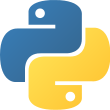 Language
Language
- Python 3
 Reading time
Reading time
- Approximately 82 days
 What you will learn
What you will learn
- Recipes
- Web Development
- Numerical Programming and Data Mining
 Author
Author
- Steven F. Lott
 Published
Published
- 9 years, 2 months ago
Key Features
- Develop succinct, expressive programs in Python
- Learn the best practices and common idioms through carefully explained and structured recipes
- Discover new ways to apply Python for the new age of development
Book Description
Python is the preferred choice of developers, engineers, data scientists, and hobbyists everywhere. It is a great scripting language that can power your applications and provide great speed, safety, and scalability. By exposing Python as a series of simple recipes, you can gain insight into specific language features in a particular context. Having a tangible context helps make the language or standard library feature easier to understand.
This book comes with over 100 recipes on the latest version of Python. The recipes will benefit everyone ranging from beginner to an expert. The book is broken down into 13 chapters that build from simple language concepts to more complex applications of the language.
The recipes will touch upon all the necessary Python concepts related to data structures, OOP, functional programming, as well as statistical programming. You will get acquainted with the nuances of Python syntax and how to effectively use the advantages that it offers. You will end the book equipped with the knowledge of testing, web services, and configuration and application integration tips and tricks.
The recipes take a problem-solution approach to resolve issues commonly faced by Python programmers across the globe. You will be armed with the knowledge of creating applications with flexible logging, powerful configuration, and command-line options, automated unit tests, and good documentation.
What you will learn
- See the intricate details of the Python syntax and how to use it to your advantage
- Improve your code readability through functions in Python
- Manipulate data effectively using built-in data structures
- Get acquainted with advanced programming techniques in Python
- Equip yourself with functional and statistical programming features
- Write proper tests to be sure a program works as advertised
- Integrate application software using Python
About the Author
Steven F. Lott has been programming since the 70s, when computers were large, expensive, and rare. As a contract software developer and architect, he has worked on hundreds of projects, from very small to very large. He's been using Python to solve business problems for over 10 years.
He’s currently leveraging Python to implement microservices and ETL pipelines. His other titles with Packt Publishing include Python Essentials, Mastering Object-Oriented Python, Functional Python Programming, and Python for Secret Agents.
Steven is currently a technomad who lives in various places on the east coast of the U.S. His technology blog is http://slott-softwarearchitect.blogspot.com and his LinkedIn address is https://www.linkedin.com/in/steven-lott-029835.
Table of Contents
- Numbers, Strings, and Tuples
- Statements and Syntax
- Function Definitions
- Built-in Data Structures – list, set, dict
- User Inputs and Outputs
- Basics of Classes and Objects
- More Advanced Class Design
- Functional and Reactive Programming Features
- Input/Output, Physical Format, and Logical Layout
- Statistical Programming and Linear Regression
- Testing
- Web Services
- Application Integration
- Works/Worked at CapitalOne
